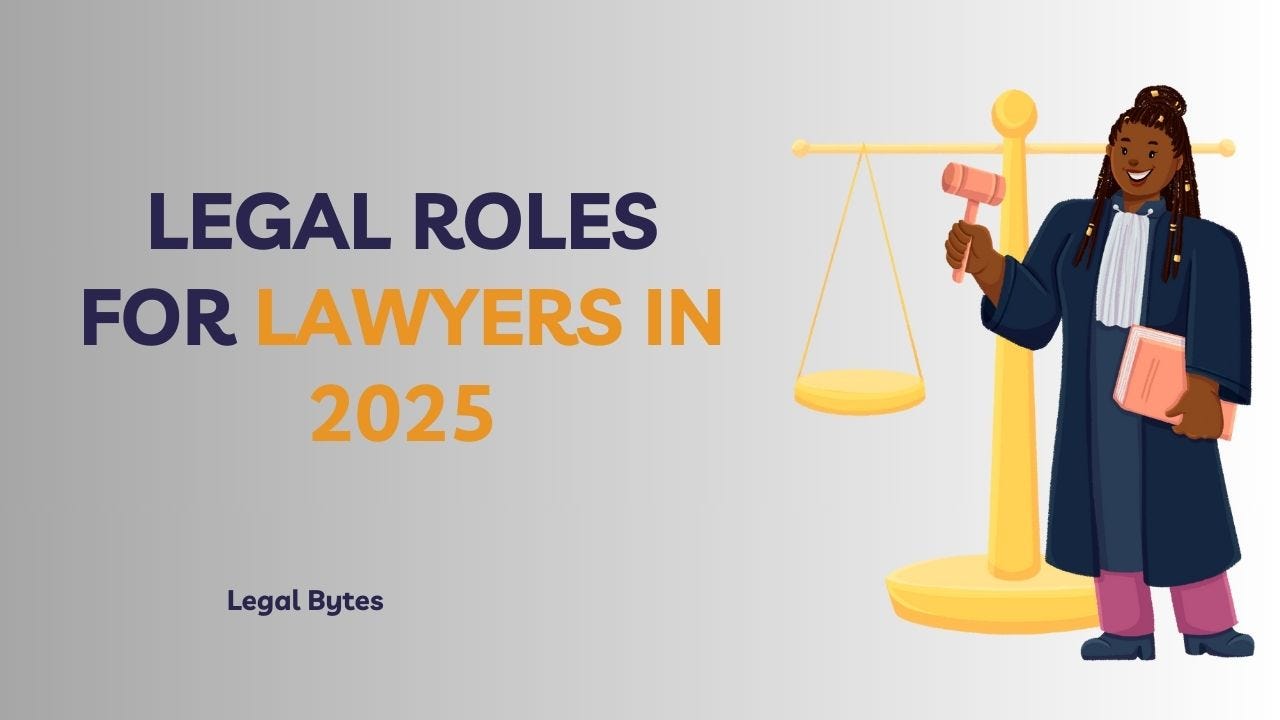NEW LEGAL ROLES FOR LAWYERS IN 2025
What are some specialized and non-specific legal roles for lawyers to look into in 2025?
The legal sector is evolving rapidly, with new roles emerging as law firms, corporations, and tech companies adapt to modern challenges.
Here are some of the latest roles and job openings that reflect current trends in the legal profession;
Specialized Legal Roles
1. Data Privacy and Compliance Officer
Role Overview: With the proliferation of data privacy regulations (like GDPR, CCPA, and Nigeria’s NDPA), this role is essential for ensuring that companies comply with laws protecting personal information.
Key Responsibilities include overseeing compliance programs, managing data privacy audits, handling data breaches, and ensuring policies align with regulatory standards.
Skills Required: Knowledge of data privacy laws, risk management, and tech-related privacy risks.
2. Cybersecurity Legal Advisor
Role Overview: Companies need legal experts who understand cybersecurity and can advise on regulatory compliance, risk management, and breach response.
Key Responsibilities include advising on cybersecurity protocols, ensuring regulatory compliance, overseeing incident response, and handling data breach litigations.
Skills Required: Experience with cybersecurity regulations and best practices, risk identification and management, and data protection laws.
3. Artificial Intelligence (AI) and Automation Counsel
Role Overview: As AI use expands, companies need lawyers who can navigate the legal risks associated with these technologies.
Key Responsibilities include assessing the legal implications of AI implementations, drafting contracts for AI usage, managing intellectual property concerns related to AI, and advising on ethical and regulatory issues.
Skills Required: Expertise in IP law, familiarity with AI regulations, and understanding of ethical issues in tech.
4. Intellectual Property (IP) Strategist
Role Overview: With increasing innovation, companies are creating dedicated IP strategist roles to optimize their IP portfolios and maximize value.
Key Responsibilities include managing IP portfolios, developing strategies to monetize copyright, patents, and trademarks, overseeing IP litigation, and advising on IP acquisition and licensing.
Skills Required: Strong IP law background, knowledge of IP portfolio monetization and management, and familiarity with IP acquisition and licensing.
5. Environmental, Social, and Governance (ESG) Legal Advisor
Role Overview: ESG roles are growing due to increasing demands for corporate accountability on social, environmental, and governance fronts.
Key Responsibilities include advising on ESG compliance, developing corporate social responsibility policies, ensuring adherence to environmental regulations, and supporting sustainability initiatives.
Skills Required: Knowledge of environmental and corporate law, understanding of ESG metrics, and experience in compliance.
6. Corporate Restructuring and Insolvency Lawyer
Role Overview: This role has become increasingly important as companies navigate financial challenges and restructuring needs.
Key Responsibilities include advising on mergers, acquisitions, and restructuring, handling bankruptcy cases, and overseeing asset sales in distressed situations.
Skills Required: Strong background in corporate finance law, understanding of bankruptcy proceedings, and experience in M&A.
7. Blockchain and Cryptocurrency Counsel
Role Overview: As blockchain and cryptocurrency industries grow, companies need legal experts to handle regulatory compliance and litigation.
Key Responsibilities include advising on regulatory issues in blockchain and crypto, drafting smart contracts, handling crypto-related disputes, and overseeing compliance with emerging crypto regulations.
Skills Required: Knowledge of cryptocurrency regulations, understanding of blockchain technology, and experience with financial regulatory law.
8. Legal Operations Manager
Role Overview: Legal operations professionals optimize the efficiency of legal departments by streamlining processes and adopting new technology.
Key Responsibilities include implementing tech tools in legal workflows, managing budgets, improving contract management, and overseeing compliance programs.
Skills Required: Project management, familiarity with legal tech, and strong analytical skills.
9. Remote In-House Counsel and Contract Lawyers
Role Overview: More firms and companies are hiring remote legal talent, reflecting the shift toward remote work flexibility.
Key Responsibilities include providing legal support in various domains like corporate, IP, labor law, etc., remotely, while maintaining communication with core teams.
Skills Required: Adaptability, strong self-management skills, and expertise in the chosen legal domain.
10. Compliance and Regulatory Specialist in Financial Technology (FinTech)
Role Overview: With the rapid expansion of the FinTech industry, compliance experts are in high demand to navigate complex financial regulations.
Key Responsibilities include ensuring regulatory compliance with financial laws, managing compliance risks, and overseeing AML (Anti-Money Laundering) and KYC (Know Your Customer) programs.
Skills Required: Knowledge of financial regulations, AML, and FinTech operations, and risk management expertise.
Non-Specialized Legal Roles
In addition to the above specialized roles, various non-specific, yet increasingly critical, legal roles are emerging to support the evolving needs of modern law firms and corporate legal departments.
Here are some of these roles that require versatile legal skills and are not confined to one particular area of law:
1. Legal Project Manager
Role Overview: Legal project managers work to streamline processes, manage workflows, and ensure efficient case handling, helping firms meet deadlines and budgets.
Key Responsibilities include coordinating legal projects from initiation to closure, managing resources and timelines, overseeing budget allocation, and enhancing client communication.
Skills Required: Project management, organizational skills, understanding of legal processes, and familiarity with tools like Lean or Agile.
2. Legal Operations Analyst
Role Overview: This role supports legal teams by analyzing and optimizing operational performance, creating efficiency in processes, and managing resources.
Key Responsibilities include data analysis, process improvement, vendor management, contract management, and implementing tech solutions to streamline workflows.
Skills Required: Analytical mindset, understanding of legal workflows, knowledge of legal tech tools, and ability to work with cross-functional teams.
3. Contracts Manager
Role Overview: As businesses engage in increasingly complex contracts, this role ensures that contract terms are clear, compliant, and aligned with company goals.
Key Responsibilities include drafting, reviewing, negotiating, and managing contracts, mitigating risks, maintaining a contract repository, and ensuring compliance with regulations.
Skills Required: Contract law knowledge, negotiation skills, attention to detail, and experience with contract management systems.
4. Legal Content Writer or Legal Knowledge Manager
Role Overview: Legal content writers and knowledge managers help firms create internal and external documentation, research updates, and client-facing content to improve legal knowledge sharing.
Key Responsibilities include drafting and curating content, managing knowledge databases, supporting training initiatives, creating legal insights, and tracking industry trends.
Skills Required: Strong writing and research skills, attention to legal details, familiarity with knowledge management tools, and understanding of content management systems.
5. E-Discovery Specialist
Role Overview: E-discovery specialists manage electronic discovery processes, which have become crucial as cases increasingly rely on digital evidence.
Key Responsibilities include overseeing e-discovery processes, managing data collection, implementing e-discovery software, and ensuring compliance with digital evidence regulations.
Skills Required: Knowledge of e-discovery tools, understanding of litigation procedures, technical skills, and ability to handle large volumes of data.
6. Risk and Compliance Associate
Role Overview: These associates help companies proactively identify, assess, and mitigate legal and regulatory risks.
Key Responsibilities include conducting risk assessments, monitoring regulatory changes, implementing compliance programs, and drafting policies to manage legal risks.
Skills Required: Risk management, compliance knowledge, analytical skills, and an understanding of the regulatory landscape.
7. Legal Technologist or Legal Innovation Officer
Role Overview: Legal technologists drive technology adoption within legal teams, enhancing productivity, workflow, and client experience.
Key Responsibilities include assessing tech needs, implementing legal tech solutions, managing tech integrations, training teams, and enhancing data security protocols.
Skills Required: Tech-savvy, understanding of legal operations, project management skills, and knowledge of legal software like document automation and contract management tools.
8. Client Relationship Manager
Role Overview: Client relationship managers focus on strengthening relationships with clients to enhance satisfaction, retain business, and grow accounts.
Key Responsibilities include managing client communications, handling client inquiries, overseeing client onboarding, and helping clients understand the legal services offered.
Skills Required: Strong interpersonal skills, legal knowledge, client-focused approach, and experience with customer relationship management tools.
9. Billing and Pricing Analyst
Role Overview: These analysts work within legal teams to structure pricing, manage billing, and maximize profitability by ensuring that services are efficiently priced.
Key Responsibilities include reviewing billing procedures, analyzing profitability, creating pricing strategies, and managing client budgets and billing inquiries.
Skills Required: Financial analysis, pricing strategy knowledge, familiarity with billing software, and attention to financial compliance.
10. Litigation Support Specialist
Role Overview: A litigation support specialist bridges the gap between legal and technical teams, particularly in complex cases that require large-scale data handling.
Key Responsibilities include managing case data, working with electronic discovery tools, providing support in the organization of evidence, and coordinating with external vendors.
Skills Required: Technical proficiency, understanding of litigation processes, organizational skills, and experience with discovery and litigation software.
11. Legal Process Outsourcing (LPO) Coordinator
Role Overview: With the rise in outsourcing legal tasks, LPO coordinators manage relationships with third-party vendors handling outsourced legal work.
Key Responsibilities include selecting and coordinating with LPO providers, ensuring quality control, monitoring project timelines, and maintaining compliance.
Skills Required: Vendor management, project coordination, understanding of outsourced legal services, and quality assurance.
12. Talent and Professional Development Coordinator
Role Overview: This role focuses on recruiting, training, and developing legal talent, ensuring firms retain a competitive edge through skilled teams.
Key Responsibilities include organizing recruitment drives, managing onboarding programs, coordinating continuing education, and overseeing talent development initiatives.
Skills Required: HR knowledge, organizational skills, familiarity with legal competency frameworks, and communication skills.
These new roles underscore the importance of specialized legal knowledge in response to rapid changes in technology, data, and corporate governance, While the non-specific roles support various functions across the legal spectrum, helping firms and legal departments become more efficient, client-focused, and tech-savvy.
As law continues to intersect with business, technology, and client engagement, these roles offer diverse career paths within the legal industry. For lawyers aiming to expand their skill set, a focus on technology, IP, compliance, and regulatory expertise will be particularly beneficial.
Are you interested in any of these roles? What strategies or resources to upskill are you considering?
About Legal Bytes
We are Adune Legal’s weekly Newsletter, which simplifies the Law for Busy Executives, Entrepreneurs, and Tech Enthusiasts interested in the legal aspects of Business, Technology, and Intellectual Property.
We love emails from our readers— reply to this email and let us know your thoughts and suggestions.
WAIT!!!
Become a paid subscriber and access;
Q&A sessions with Nneoma Grace via chats on Substack.
Detailed Legal Templates and examples to save you time and legal fees
Expert Interviews and Case Studies
Don't miss out on these perks - subscribe today and start enjoying it!
Thanks for reading Legal Bytes
Adune Legal’s Team
P.S. Like Legal Bytes? Please forward us to a friend.
P.P.S. Was this publication forwarded to you? Sign up here & see previous publications.





